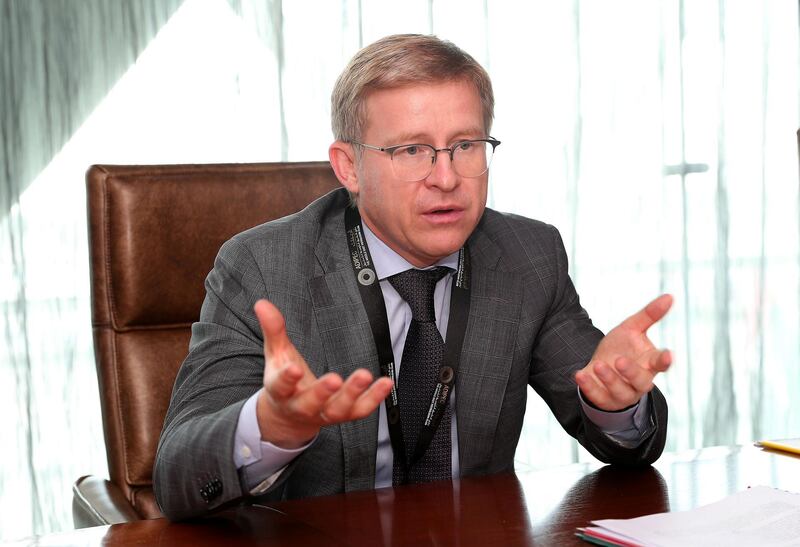Gazprom Neft, Russia’s third-largest oil producer, will take part in Abu Dhabi’s oil and gas licencing round and participate in developing new reserves, as the company bolsters its partnership with Mubadala Petroleum.
Gazprom Neft, the oil arm of Russian gas giant Gazprom, would like to partner with Mubadala in the UAE, Egypt, Oman and Iraq after joining hands in a project in Russia, deputy chairman Vadim Yakovlev told The National.
“Both Gazprom Neft and Mubadala are considering and discussing some opportunities in Russia and we hope that our partnership will give us access to additional transactions in the Middle East,” he said.
Mubadala Petroleum, a unit of Abu Dhabi strategic firm Mubadala Investment Company, finalised in September a deal to acquire a 44 per cent stake in oil joint venture, Gazpromneft-Vostok, which operates 13 fields in Western Siberia.
The Russian Direct Investment Fund, the country’s sovereign wealth fund, also took a 5 per cent stake in the venture.
Mubadala Petroleum manages assets and operations currently spanning eight countries with a geographic focus on the Middle East and Southeast Asia. The Abu Dhabi company's average production in 2017 was around 320,000 barrels of oil equivalent per day.
Gazprom Neft is in talks with Abu Dhabi National Oil Company to participate in developing new oil and gas reserves announced earlier this month. Abu Dhabi discovered 15 trillion cubic feet of gas in existing and untapped blocks. The discoveries would add 7.1 per cent to existing reserves of gas, which stood at around 209.7 trillion cubic feet at the end of 2017, according to the latest BP Statistical Review of World Energy.
State-owned Adnoc also discovered one billion barrels of oil , equivalent to a one per cent increase in existing reserves.
____________
Read more:
Mubadala and Russia's sovereign wealth fund seal oil deal
Adnoc awards 40 per cent stake to Total for unconventional gas field
____________
Earlier this week, Adnoc awarded French oil major Total a 40 per cent stake in an unconventional gas concession and has received interest from other foreign oil and gas firms to develop these reserves.
Gazprom Neft could partner with Mubadala, Adnoc and other companies in the development of oil and gas reserves, said Mr Vakovlev.
“Realistically the best way for us to start in the UAE is to start as a member of a consortium and from this base develop our presence further,” said Mr Vakovlev.
“It could be participation with Adnoc, Mubadala or any other partners.”
Gazprom Neft’s only presence in the Middle East is in Iraq, where it operates fields in the federal state and the semi-autonomous Kurdistan region.
Iraq’s Badra field is expected to produce 75,000 bpd, down from 85,000 bpd this year because of natural decline, Mr Vakovlev said, adding that Gazprom Neft has options to drill horizontally to maintain production.
In Kurdistan, the company is producing 30,000 bpd and expects to maintain that level next year.
Gazroprom Neft, which produces 20 per cent of its oil from Russia’s Yamal arctic region, is targeting reaching an oil production capacity of 2 million barrels of oil equivalent by 2020, up from 1.86 million boe this year.
The company, which spends about $4 billion a year on its upstream projects, makes its investments based on an oil price forecast of $50 a barrel in addition to an internal rate of return of 15 per cent, said Mr Yakovlev.
Gazroprom Neft’s plans are not affected by an agreement between a Russia-led group of oil producers and Opec countries, who started in January last year trimming global oil output by 1.8 million bpd to lower oil inventories only to reverse them in May amid shortage in oil supply.
Now the Opec+ group, as the alliance is called, could cull output by up to one million bpd next year if needed, the Saudi oil minister Khalid Al Falih said on Monday.
“Our drilling plans allow us to flexibly react to guidance we receive from Opec+ agreement participants,” said Mr Yakovlev.






